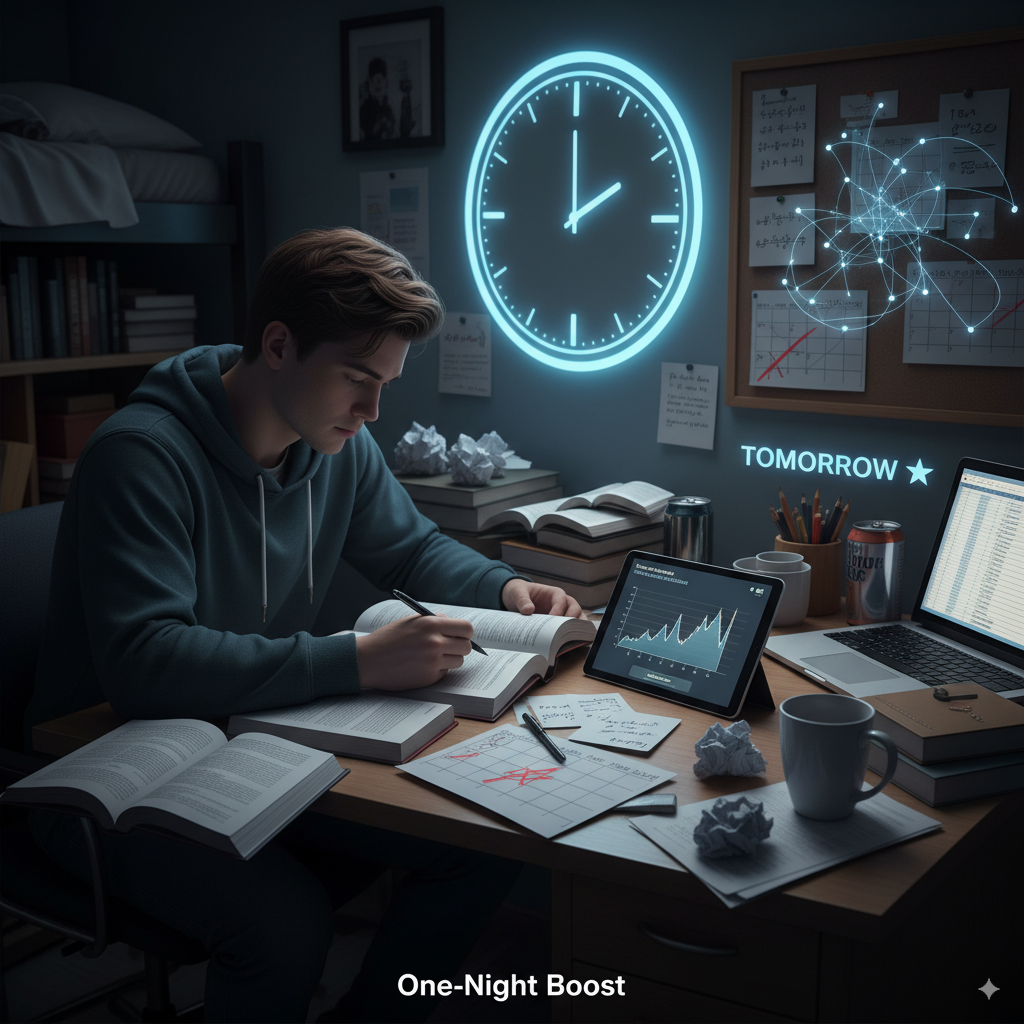


It is also midnight and your exam is the next day. You are stressed, tired, and unprepared. The good news is that you can still successfully how to pass an exam during one night provided that you study smart. The significance of exams is that it determines your grades, scholarship, career, and confidence. However, life is like that perhaps you came to work half time, you studied late, or you test-took unexpectedly. You are not alone. This manual will assist you in overcoming it.
It seems difficult to pass an exam after one night of preparation. The pressure may be intense, and lots of students express their doubts whether it is feasible at all. The reality is that cramming is not a new concept and as much as it is risky, it can be effective provided that you do it in the proper manner. We will discuss this step by step.
Students usually tend to ask themselves, why am I in this situation? The reasons are not unusual. The truth is that a majority of students will experience a similar challenge at one time or another in their academic life.
Here are some common reasons why cramming happens:
Reassurance: In case you are cramming now, you are not alone. It is the problem of many students, and millions of other students have succeeded in the similar situation.

Cramming might be tempting, yet it has its difficulties. The risks should be known to be ready prudently.
Tip: Awareness of such risks makes you make better decisions. You need not panic, but can combine both study and relaxation, and also apply techniques that make memory even better when you are in a hurry.
Here comes the hopeful part, yes, one can pass an exam after only one night of studying. The trick is not to waste time. You do not need to attempt to study everything, but rather study what is most important.
This is why one-night studying may be effective:
Encouragement: A lot of students have passed and even excelled after one night of smart study. The limited time can be used to significant outcomes with the correct attitude and approaches.
Cramming is not the best but a common thing. The fact that you know the causes behind it, the dangers it involves and that it can still be successfully achieved means that you have already made a step toward controlling the situation. The trick is to remain calm, make a strategy and employ methods which have worked out so that you make the best out of the time you have to spend.

Preparing an exam within a single night is not only about studying the exam but also about conditioning your mind and the surrounding. It will be greatly different in the way you think, the surrounding, and the manner in which you spend your time. This part will take you through three major steps, which include getting your mind set, finding the right environment to study and managing your very limited time using a smart schedule.
The initial approach is by mastering the control of thoughts. Stress and panic may consume valuable time. Rather than that, concentrate on the present.
With an active and relaxed attitude, you are in a position to take in more knowledge and remain productive up to the examination period.
Your environment shapes your focus. A messy or noisy space can slow you down, while a clean and quiet one can boost your energy. Take a few minutes to set up your study area before you begin.
A well-organized space reduces stress and allows you to focus on studying without interruptions.

Time constraint is the most significant problem of studying in a short duration. To manage this, you should have a well-thought strategy that will combine both study and rest. A systematic plan helps you not to become tired of work and discuss the most significant matters.
Study in Blocks
Balanced Routine
Avoid studying for long hours without stopping. Mix reading, summarizing, and practicing questions to keep your mind active.
Example One-Night Timeline
Here’s a sample schedule you can adapt to your needs:
This routine can be good to balance between learning, taking a break and revising so that your brain is sharp and prepared to the test.
Preparation before a night exam cannot be achieved by reading books. You must have clever tricks that save time, sharpen the memory, and concentrate on the most crucial things. With the help of the correct techniques, you will be able to transform a single night of study into meaningful results. Let us discuss five practical strategies, which will make you ready fast and effective.
There is not enough time to study everything. The trick is to prioritize on those areas that provide the best returns.
Prioritization will help you to invest your efforts in the areas that are likely to present themselves as you will have a higher likelihood of success.

Reading passively will not help in cramming. Active recall method strains your brain to recall something and this leads to better retention.
These methods enable you to retain more within a shorter time and this is very important when you have to prepare at a short notice.
When studying late, long notes are overwhelming. Instead, compress information into shorter, simpler forms.
Condensed notes give you a quick review tool and reduce the risk of information overload.
Exams are not only about memorizing—they are about applying knowledge. Practicing questions is one of the fastest ways to prepare.
Practicing questions helps you predict the exam format and boosts confidence.
Some students prefer studying with others, while others perform better alone. Both methods have pros and cons.
If you choose group study, keep it short and focused. For one-night prep, solo study with limited peer discussions is usually more effective.
Revision before a test means using intelligent memory skills. Time constraint means you need to work on strategies that will ensure you retain information faster and keep in mind until the examination. The following four are some of the effective hacks that will help increase your retention in the overnight.

Instead of reading the same notes for hours, use short cycles of review:
Even in one night, repeating this cycle two to three times will strengthen your memory.
Our brains remember images and stories better than plain text. Try these tricks:
Visualization makes abstract concepts easier to recall during exams.
Large amounts of data can overwhelm your memory. Break them into smaller groups:
Chunking simplifies complex material, making it easier to store and retrieve.
Speaking and listening can improve recall:
This method works like “passive revision,” letting you learn even while relaxing.
The all-night study is not only reading and memorizing. Your brain and your body require the appropriate attention in order to be alert, active, and productive. Students commit the error of neglecting sleep, food and energy management that may damage performance during exams. With just a few tips on how to get rest, nutrition, and alert you can be at your best and optimize your productivity.
Even spending the all-nighter might seem like the only option, yet not getting any sleep at all can be counterproductive. When you rest, your brain is more likely to process information. Smart sleep methods will work instead of spending the entire night awake.
A mix of short naps and a light morning rest will keep you alert without wasting too much study time.
What you eat affects how well your brain works. Heavy or sugary foods can make you tired, while the right snacks can boost focus and memory.
Smart eating keeps your energy balanced throughout the night and avoids sudden crashes.
Many students rely on coffee or energy drinks to stay awake. While caffeine helps, too much can cause jitters, stress, or an energy crash during the exam. Use it wisely, and try healthier alternatives too.
The goal is to stay awake naturally, without overstimulation that could harm your exam performance.
You can easily get disoriented when you only have a one-night preparation time. This is why a good action plan can keep you focused and self-assured. With a few simple steps taken and the help of additional support resources, you will be able to transform panic into progress.
Before you dive into studying, make sure you are fully prepared. Use this survival checklist to keep yourself on track:
Following this checklist ensures you don’t waste time searching for things or fighting distractions.
Sometimes, a little outside help can make studying faster and easier. Consider these tools if you have access to them:
While not essential, these resources can give you an edge when time is short.
FAQs
There are usually general anxieties that students experience the eve of an exam. The following are responses to the most common questions which can make you feel more prepared and confident.
Yes. Focus on high-value topics that are more likely to appear. Covering 60–70% of the syllabus strategically can be enough to pass, and sometimes even score well. Prioritize quality over quantity.
Aim for at least 2–4 hours of rest. Even a short sleep improves memory, focus, and problem-solving skills. Skipping sleep entirely can reduce your performance during the test.
It depends on how you manage it. If you stay up, include short naps to refresh your brain. A complete all-nighter with zero rest can make you too tired to concentrate. Balance is better.
Go for a mix. Memorize formulas, definitions, and key terms. For complex concepts, try to understand the basics. Understanding helps you handle unexpected questions, while memorization ensures you score on direct ones.
Take deep breaths before starting. Read the paper fully and answer questions you know first. Remind yourself that you prepared as best as possible. Confidence comes from focusing on what you can control.
A night might seem not to be long enough to study to pass an exam and through proper planning, good results are attainable. Rather than regretting about time wasted, concentrate on tasks now that you can do, make priority on important issues employ basic memory tips, regulate your energy, resting, eating unhealthy foods and adhering to a clear schedule. And do not take this as an unsuccessful experience but a challenge to your will. Use these tips in your exams and walk into your exams with the confidence that you can do this.
